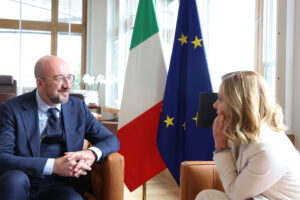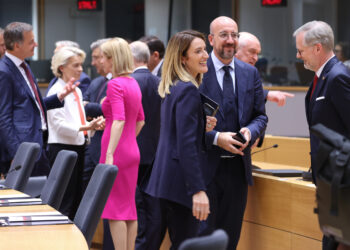Brussels – “There is a majority even without Giorgia Meloni,” claims the Prime Minister of Poland, Donald Tusk. It is certainly true at the table of the heads of state and government of the 27 EU member states, who are to make the final decision next week on EU appointments to the top posts in the Union institutions. However, if at the European Council, the Italian premier has almost no room for manoeuvre on the proposed names, it is in a few weeks (assuming a decision does come at the June 27-28 summit) that her party, Fratelli d’Italia, may try to become decisive in the vote in the European Parliament to support the next presidency of the EU Commission.

The proof that for Meloni, the EU appointments game is necessarily played on multiple levels and stages—some as an extra and some potentially as a protagonist—was seen at last night’s Informal Summit of the twenty-seven countries (June 17), the first real confrontation between EU leaders over the almost consolidated package on the four names for the four top posts of EU institutions: Ursula von der Leyen and Roberta Metsola for confirmation to the Commission and Parliament, respectively; Portugal’s former prime minister, António Costa, to the European Council; and Estonia’s premier, Kaja Kallas, as EU High Representative for Foreign Affairs and Security Policy. As made clear by the President of the European Council, Charles Michel, the goal of yesterday’s dinner was not to arrive already at a decision (in legal terms, it could not have been done) but rather to “prepare the ground” for next week’s European Council and ensure that the presiding institution can guarantee the “unity of the European Union” in the future as well.

For the Italian premier, the possibility of influencing this field was almost nil since political games were set between the premiers of the three European parties on which the majority in the European Parliament will continue to be based, namely the Populars, Socialists and Liberals, so much so that even the point of greatest instability has come from the European People’s Party (EPP) – the one who got stronger in the last European elections – which has proposed applying the two-and-a-half-year relay to the presidency of the European Council as well, just as it does to the EU Parliament. All the names in the package came from a dialogue between the three European political families, and for Meloni, chair of the European Conservatives and Reformists Party (ECR), there was no chance of fitting in. If the Italian premier has at least avoided—at the moment—controversy, the same cannot be said of her Hungarian counterpart, Viktor Orbán (who would like to sit among the European conservatives): “The will of the European citizens has been ignored and the EPP, instead of listening to the voters, has in the end allied with the Socialists and Liberals to divide the EU’s command posts,” he attacked at the end of the informal summit.
Meloni, however displeased she was that she could not play the key role she had tried to carve out for herself on the eve of the elections, especially for the nomination of the Commission presidency, avoided controversy for a reason: because her real game will be played in the hemicycle of the European Parliament. When the 720 MEPs will have to vote to support the new EU Commission chairmanship (if the decision of the twenty-seven comes next week, it could be scheduled as early as the July 16-19 inaugural session), the majority composed of Populars, Social Democrats, and Liberals will count on 406 seats (with 89 among new members and non-attached members who do not yet have a political home in the Euro Chamber). The minimum threshold is 361, but the risk of turncoats during the secret ballot—even in the event of von der Leyen’s encore—could push the Populars to look to the 24 MEPs of Fratelli d’Italia for support in the vote, as the Polish ultraconservatives of Law and Justice (PiS) did in 2019 the first time the German politician showed up at the Strasbourg plenary. Here, Meloni could make her role count in the EU nomination game, then claim a significant portfolio in the next EU executive or even an executive vice-presidency. The scenario is wide open, also given the increasingly closed door of the European People’s Party to the 52 Green MEPs who are willing to join the majority.
The EU nomination package between Meloni and the other 26 leaders
The European People’s Party has already confirmed that, after the convincing electoral test of the national parties affiliated with the EPP, they expect to get both the Commission and Parliament presidencies in perfect continuity with the end of the ninth legislature. This is also true for the names, Germany’s von der Leyen and Malta’s Metsola, respectively. As for the former, there do not appear to be any credible alternatives for the leadership of the Union’s executive, although von der Leyen must guard against the political uncertainty that reigns in several European capitals. As for the presidency of the European Parliament, the strong name is still Metsola, who has led the EU institution since January 2022, and the likely election is expected to come at the inaugural plenary session of the 10th legislature between 16 and 19 July. As for the relay between the Populars and Social Democrats during the presidency of the EU Parliament, the Populars are already beginning to ventilate that they have little interest in sharing the office over the next five years of the legislature.
European Socialists are staking all their cards on the next presidency of the European Council, having reconfirmed themselves as the second force in the EU Parliament and limiting the risk of haemorrhaging votes. The European Socialists remain the unavoidable partner for the populars in the centrist majority in the EU Parliament, which is why, given the parallel collapse of the Liberals, they are now aiming for more than just the EU high representative (as they have in the last two terms). The clear favourite is Portugal’s ex-premier Costa, given that in other capitals, the investigation turmoil of alleged corruption that forced him to resign in November 2023 is not considered an issue. However, it does not concern him personally. The biggest unknown is the Populars’ proposal for a relay after two and a half years, which risks sowing discord in relations between the two political families.
Finally, there is the last post at stake after the European elections, which, in the logic of dividing the top EU institutions’ leadership between parties, is claimed by the liberals. In pole position for the post of EU High Representative for Foreign Affairs and Security Policy is the current Estonian PM Kallas, who, since February 24, 2022, has carved out the role of irreproachable leader at the side of Russia-invaded Ukraine, among the most determined at the table of the 27 EU leaders. This card could earn the Estonian premier a promotion to head the Union’s foreign policy as a statement of support for Kyiv that, after more than two years, is not likely to wane from Brussels.
English version by the Translation Service of Withub



![Il ministro degli Esteri e vicepresidente del Ppe, Antonio Tajani [Bruxelles, 17 giugno 2024. Foto: Emanuele Bonini]](https://www.eunews.it/wp-content/uploads/2024/06/tajani-epp-350x250.png)







![Una donna controlla le informazioni sul cibo specificate sulla confezione [foto: archivio]](https://www.eunews.it/wp-content/uploads/2014/12/Etichette-alimentari.jpg)

